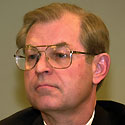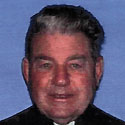Missive Says DA Agreed to Keep Case out of Court
By Marie Rohde
Milwaukee Journal Sentinel
May 14, 2008
http://www.jsonline.com/story/index.aspx?id=751121
Newly filed court documents provide details involving a meeting between then-prosecutor David Prosser and the bishop of the Green Bay Catholic diocese regarding a sexual abuse investigation against a priest in 1978 that could raise more questions about Prosser's closeness to the church.
The new documents, including a letter from then-Green Bay Bishop Aloysius J. Wycislo, were filed this week and are part of an Outagamie County civil lawsuit brought by Troy and Todd Merryfield, two men who were abused by Father John Patrick Feeney in the 1970s when they were children.
 |
| Prosser: State Supreme Court justice and former DA |
Feeney, now 81, was convicted in 2004 and sentenced to 15 years in jail for assaulting the Merryfields. The civil lawsuit is seeking damages from the Diocese of Green Bay and its insurance company.
According to the letter, Prosser, who is now a state Supreme Court justice, met with Wycislo in December 1978 during an investigation of Feeney, a priest who had a history of complaints alleging misconduct, which were not made public at the time.
It is unclear exactly when Prosser, who was elected to the state Assembly in November 1978, met with Sharon Merryfield, the mother of the victims. He left his job as prosecutor in January 1979 when he was sworn in as a state legislator. She filed a complaint with law enforcement officials on Jan. 7 or 17, 1979, according to records, after she found out that Feeney had been transferred to another parish rather than being removed from the ministry.
According to previously released documents, Prosser, in his meeting with Sharon Merryfield, told her he did not want to prosecute the priest because a trial would "be too hard on the boys."
Wycislo noted in his letter that Prosser is not a Catholic but came to the diocese "as is usual in such cases and out of respect for the position of the church, and in order to prevent unnecessary scandal."
The 1978 Wycislo letter, which was sent to the chairman of the priest personnel board, noted that church officials had already concluded that there was no alternative but to remove Feeney from St. Nicholas Parish in Freedom but had not yet acted.
"I had to agree with the district attorney that the church would prefer to keep this out of court and out of the public eye and I was able to tell him of our decision last week with which he agreed," Wycislo wrote.
The bishop went on to say that Prosser agreed that even if Feeney were cured he could not return to parish work in the diocese or even in the state.
 |
| Feeney: Sentenced to 15 years in jail for assaulting two boys |
"He (Feeney) has too many enemies and there is too much evidence against him which the courts can no longer hide," Wycislo wrote.
Feeney, the bishop wrote, had to be replaced at St. Nicholas by the end of January 1979.
Feeney, however, went on to another parish in the diocese before leaving the state in 1985. Michael Finnegan, a lawyer representing the Merryfields, said other allegations of abuse followed in Wisconsin and in Nevada, where Feeney was allowed to work as a priest.
Peter Isely, speaking Wednesday for Survivors Network for those Abused by Priests, called on Prosser to clarify his relationship with the diocese regarding the Feeney investigation.
Prosser and the rest of the high court ruled unanimously last year that the church could be sued for fraud because of its failure to warn parishioners. In 2005, he authored a decision that barred lawsuits against the church where there was no proof that the archdiocese was aware of misconduct.
Prosser recently declined to participate in hearings before the high court on two cases involving the Catholic church and sexual abuse allegations. He did not explain why he recused himself from the cases.
He said Wednesday through a spokesman that he would respond "when the time was appropriate" to the questions involving his role in the Feeney case but declined to elaborate.
Michael McCabe, executive director of the Wisconsin Democracy Campaign, a nonpartisan political watchdog group, said the public is frustrated with the increasing frequency of Supreme Court justices stepping aside without explanation in cases before them.
"If justices recuse themselves without explanation it fuels speculation and suspicion," McCabe said. "It undermines public confidence in the court."
Any original material on these pages is copyright © BishopAccountability.org 2004. Reproduce freely with attribution.